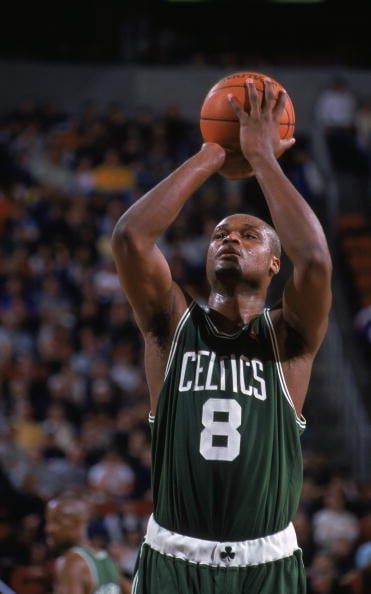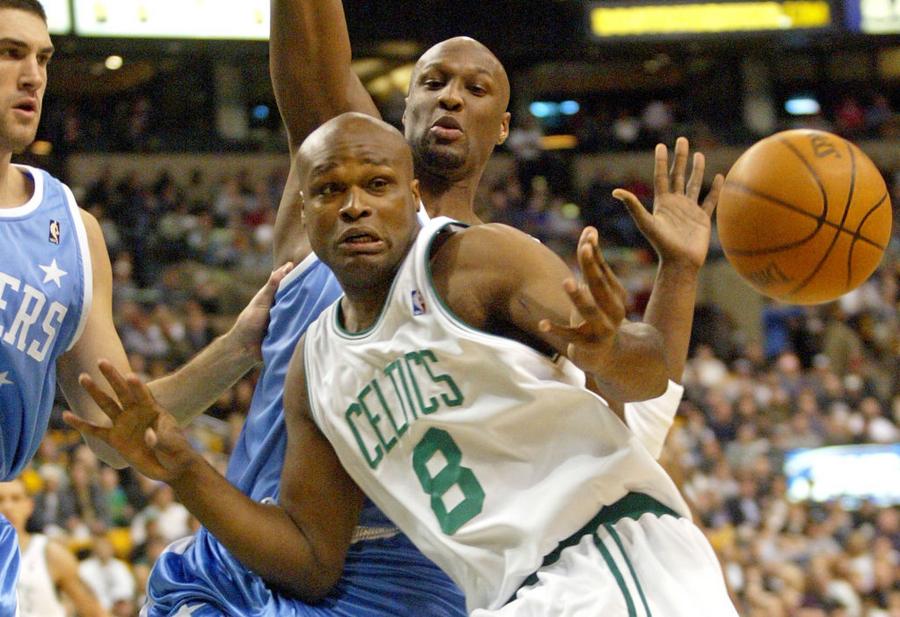Share this @internewscast.com
Antoine Walker once hoisted an NBA championship trophy. Just a few years later, he was handing over that very same ring to pay off debts. In 2006, the 6-foot-9 forward stood on top of the basketball world, celebrating a title win with the Miami Heat and basking in the glory of a 12-year NBA career that saw him earn over $110 million in salary alone. Flashy, charismatic, and confident, Walker embodied the superstar lifestyle—luxury cars, custom suits, and enough real estate to start a small empire. He was rich, he was famous, and by all appearances, he was set for life.
But behind the scenes, Walker’s financial foundation was already crumbling. He had spent lavishly on friends and family, shelled out millions on gambling and poor real estate deals, and ignored the advice of financial advisors who warned him of a reckoning to come. At one point, Walker had more than 140 properties, over a dozen luxury vehicles, and an entourage that leaned on him for everything from rent money to Vegas getaways. He wasn’t just funding his own lifestyle—he was bankrolling a small village.
Then came the crash. In 2010, just two years after playing his final NBA game, Walker filed for bankruptcy, revealing he owed over $12 million with only $4 million in assets. His bank accounts were frozen. His cars were repossessed. His championship ring was auctioned off. The man who once made $108 million had, by his own admission, burned through it all—and was now living with family, hitching rides to work, and trying to figure out how to rebuild from the ashes. This is the story of how Antoine Walker lost everything—and how, in a surprising twist, he found something even more valuable in the process.

Otto Greule Jr. /Allsport
From All-Star to $110 Million Man
Walker burst into the NBA in 1996 as a Boston Celtics phenom and quickly became a star. Over a 12-year career, he was a three-time All-Star and even won a championship with Miami in 2006. In total, Walker earned over $108 million in salary alone during his playing days.
At his peak, he owned multiple mansions, a fleet of luxury cars, and wore the swagger of a young millionaire who felt the good times would never end.
His spending habits became the stuff of legend: he maintained 8 to 10 expensive cars at all times – each with an extra $30,000 or more in customizations – and collected up to 20 luxury watches from famed jeweler Jacob the Jeweler. Walker also paid for an entourage of friends and family, lavishing them with houses and covering their expenses. In fact, supporting his inner circle cost him an estimated $36 million over the years.
“I had fetishes,” he said of his habits, which included tailored suits costing $1,500-$2,000 each (a nod to the NBA’s dress code at the time) and “lavish trips” where he’d charter flights and hotel rooms for eight or ten people just to have company.
Even as money flowed out, Walker assumed it would always flow in. He dabbled in real estate, sinking roughly $10 million into property deals with a childhood friend – a venture that went belly-up when the 2008 financial crisis hit. He also poured money into his own personal real estate.
He also developed a gambling habit that brought trouble. By 2009, the former All-Star faced felony charges for writing bad checks to Vegas casinos after racking up over $800,000 in gambling debts. Walker did have a financial advisor, but by his own admission, “as any young, arrogant kid, I didn’t want to listen to him”. Between the high life, bad bets, and the economic downturn, his fortune was evaporating fast — compounded by the inevitable bite of taxes (Walker estimates $55 million of his $108M went to taxes).
A Mansion For Mom
At the height of his wealth, Antoine spent $4 million to construct a 15,000-square-foot dream house for his mom, complete with an indoor pool. Here’s a video tour of the mansion from 2012, when (spoiler) it slipped into foreclosure and was listed for sale:
Bankruptcy and Rock Bottom
In 2010, just two years after his final NBA game, the money was gone. Walker filed for Chapter 7 bankruptcy in Miami, listing $12.7 million in debts against only $4 million in assets. The court forced him to liquidate everything he had left — including his prized NBA championship ring.
Walker later revealed his lowest point came when he had to let go of a gift he held most dear: the custom mansion he built for his mother. During the bankruptcy, owning four homes was untenable. “I asked my mom, ‘What do you want to do?'” he recounted. To his shock, she replied, “Let the house go.” Walker broke down in tears – “that was the lowest point because that’s something that you never want to do,” he said, reflecting on having to surrender the home he’d hoped would be a lasting gift. The 15,000-square-foot mansion slipped into foreclosure and was acquired in 2012 for $750,000. The home sold again in 2016 for $975,000.

(Photo by Matt Stone/MediaNews Group/Boston Herald via Getty Images)
Not Alone in Going Broke
Walker’s financial collapse, while dramatic, is far from unique. Many NBA players have suffered similar fates:
Redemption and Second Chance
Remarkably, Walker managed to rebuild his life within a few years. After his debts were discharged in 2012, he downsized his lifestyle and found steady work as an NBA analyst for Fox Sports’ FS1. But more importantly, he discovered a new mission: teaching financial literacy to young athletes.
Walker began speaking at universities and NBA rookie symposiums, sharing hard lessons from his downfall. He partnered with organizations like Morgan Stanley and Edyoucore, advising players on budgeting, investing, and avoiding financial pitfalls—the very guidance he once ignored. “I wanted to share my story,” he said, “especially after going through bankruptcy and seeing all the mistakes that I made.”
In 2020, he released a documentary, Gone In An Instant, chronicling his journey. Now in 2025, Walker leads a more modest, stable life—working as a broadcaster and speaker, and using his platform to turn personal failure into a powerful warning for others. His second act is living proof that redemption is possible—with humility, honesty, and hard-earned perspective.
(function() {
var _fbq = window._fbq || (window._fbq = []);
if (!_fbq.loaded) {
var fbds = document.createElement(‘script’);
fbds.async = true;
fbds.src=”
var s = document.getElementsByTagName(‘script’)[0];
s.parentNode.insertBefore(fbds, s);
_fbq.loaded = true;
}
_fbq.push([‘addPixelId’, ‘1471602713096627’]);
})();
window._fbq = window._fbq || [];
window._fbq.push([‘track’, ‘PixelInitialized’, {}]);







